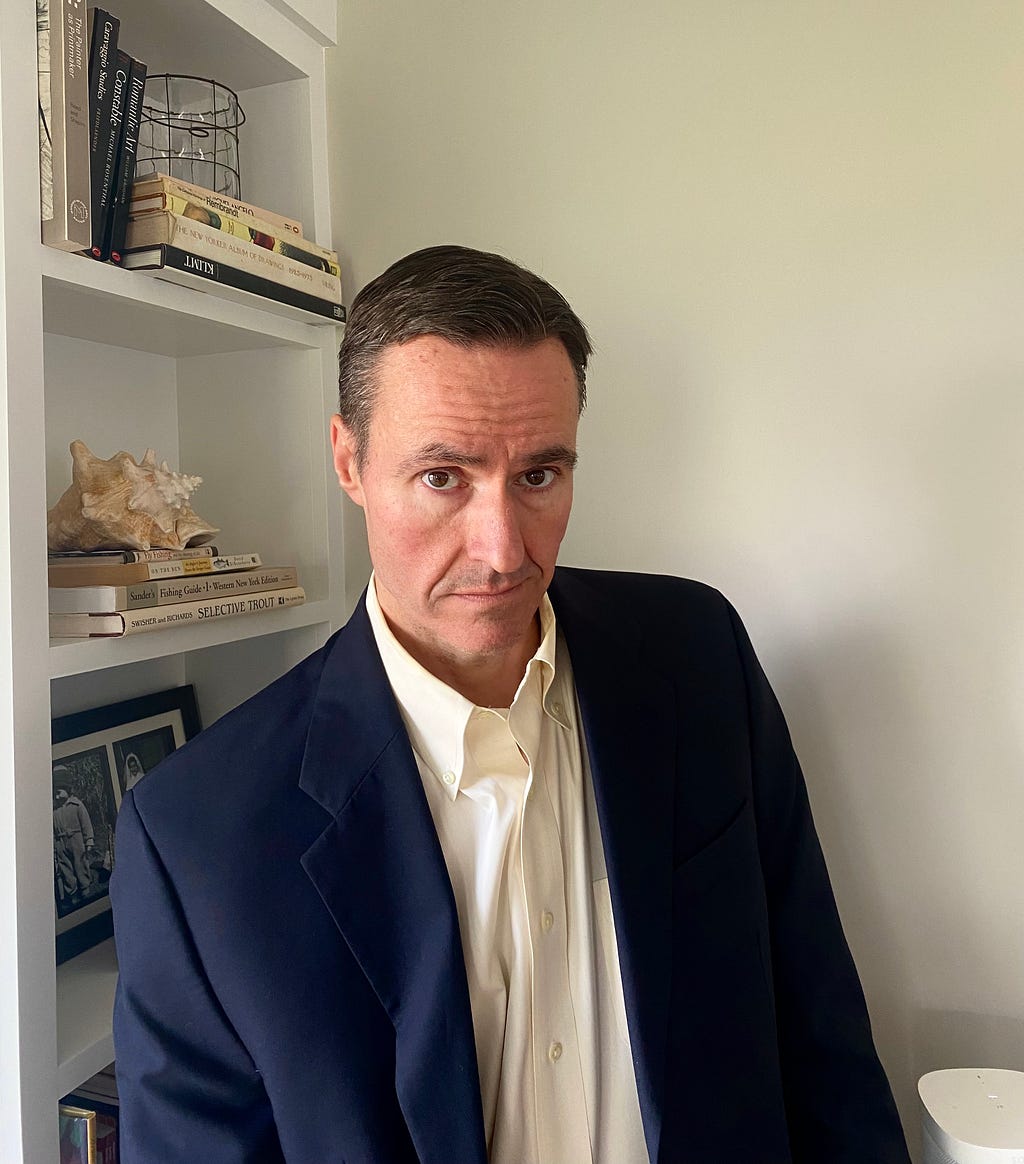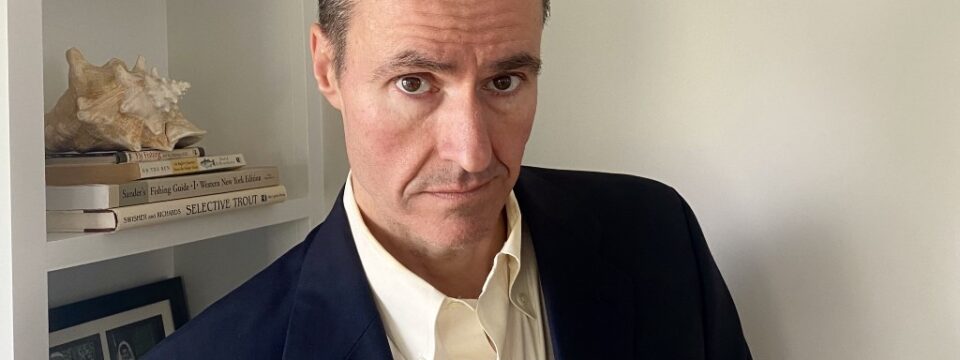
Stop waiting for things to happen and make them happen: provide necessary education, resources, and incentives for populations to get healthy; crack down on predatory companies with empty promises of expensive quick fixes for a better life.
As part of my series about “authors who are making an important social impact”, I had the pleasure of interviewing Joseph D. Pianka, MD.
Joseph D. Pianka, MD, has been a board-certified practicing gastroenterologist for over twenty years. His ultimate goal is to help as many people as possible who struggle to find motivation in regards to health and fitness. All of his proceeds from his fitness guide and motivational book, It’s All in Your Head, will be donated to Ukraine relief.
Thank you so much for joining us in this interview series! Before we dive into the main focus of our interview, our readers would love to “get to know you” a bit better. Can you tell us a bit about your childhood backstory?
I was born in Queens, New York, but really grew up in West Islip, a small town on the south shore of Long Island. My town, friends, childhood, and teen years could have been depicted by just about any John Hughs brat pack film from the 80s, the original Karate Kid, or the Stranger Things series on Netflix minus the “Upside Down.” I am an only child, so I think that factored into my being observant and reflective from a young age.
When you were younger, was there a book that you read that inspired you to take action or changed your life? Can you share a story about that?
Salinger’s Catcher in the Rye, definitely. I can vividly remember reading that book, cover to cover, within two days. When I finished, I decided I would much rather be a driver rather than passenger of life and began to question absolutely everything in the world around me. I completely identified with the character Holden Caulfield on so many levels.
It has been said that our mistakes can be our greatest teachers. Can you share a story about the funniest mistake you made when you were first starting? Can you tell us what lesson you learned from that?
That’s a tough question for me because I sincerely feel as if my entire life has been a continuous series of mistakes and a comedy of errors I’ve learned from. In fact, if I had a redeeming quality, it would probably be my ability to shake things off, make adjustments, always seek improvement, and most importantly, laugh at myself.
Can you describe how you aim to make a significant social impact with your book?
As a physician, both in dealing with patients and constantly scouring medical literature, I’m alarmed, even astounded, at current statistics related to obesity and associated comorbidities. How can this be possible with all the so-called “revolutionary” diets, supplements, fitness programs, etc. accessible with the swipe of a finger? Maybe revolutionary is not where it’s at. Maybe becoming inspired, finding an individualized starting point, learning about negative behavior patterns, and simply gaining a better understanding or becoming reacquainted with old school fundamentals is where it’s at. If anything, I hope this book simply starts a conversation that something isn’t working as per statistical trends regarding society’s current approach to health and fitness. And we need to understand why — especially following the recent COVID-19 pandemic, an ideal opportunity to begin a new, better normal going forward.
Can you share with us the most interesting story that you shared in your book?
What amazed me was how the various individuals who provided feedback for the book identified with or most appreciated such different chapters or stories. Personally, the chapters “I’m Too Tired to Work Out Today,” in which I discuss a middle of the night emergency case, and “Inspirational Moments,” in which I discuss my early fly fishing experiences, are my favorites. I’m obviously a novice at writing, but these chapters were examples of the classic writer advice to write the best you can about things you know or experiences most personal to you, hoping your readers are touched in some way. It was so difficult trying to do this and continuously keeping these ideas and feelings tied into the overall concept of the work.
What was the “aha moment” or series of events that made you decide to bring your message to the greater world? Can you share a story about that?
My “aha moment” happened during somewhat of an emotional collapse, what we now refer to as “provider burnout,” early in the pandemic, which I actually discuss in great detail in the first chapter. Overcoming this was my opportunity for not only self-improvement but to help others as well. The idea to donate proceeds to Ukraine relief was just another level.
Without sharing specific names, can you tell us a story about a particular individual who was impacted or helped by your cause?
As I was working at my computer in the hospital late one evening, I looked up and found a nurse was standing next to me with tears streaming down her face. Recently, she tragically lost her husband. He happened to be a patient and dear friend who gave me a copy of William Finnegan’s Barbarian Days before he died, which inspired parts of my book. Naturally, I sent her an early copy. When I asked her if she was OK, she said she reached a low point and wasn’t sure what the prior night would bring when she found my book in her mailbox. She started reading it immediately, got hooked, and realized the sun would rise the next morning. From that moment on, my book became a personal success and met all my objectives, everything else would be a bonus
Are there three things the community/society/politicians can do to help you address the root of the problem you are trying to solve?
- Putting healthcare back into the hands of providers and their patients where it belongs.
- Acknowledging society is on the wrong trajectory regarding health, both mental and physical wellbeing.
- Stop waiting for things to happen and make them happen: provide necessary education, resources, and incentives for populations to get healthy; crack down on predatory companies with empty promises of expensive quick fixes for a better life.
How do you define “Leadership”? Can you explain what you mean or give an example?
Leadership is when someone who walks the walk, rather than just talks the talk. It is someone who inspires rather than puts fear in the hearts of others. It is someone who believes the success of those that follow are a measure of personal success. It is someone who doesn’t want to lead forever, but would rather help create future successors better than they were. Some might even refer to this as the ultimate goals of a good parent.
What are your “5 things I wish someone told me when I first started” and why. Please share a story or example for each.
- How writing was the easy part, while editing, publishing, and publicizing were the most difficult with the countless late-night edits, emails and anticipation of completion.
- How much time these things take, which is especially challenging if your day job is something other than writing. Writing late night after work, early mornings before work, weekends, vacations and holidays.
- No matter how much you try to be tough and convince yourself that you ultimately don’t care what people think and you are simply following your heart and passion, you always care what people think. I constantly wonder what those around me think about things I wrote, especially those who I know read the book but provided no feedback. Human nature is to assume the worst.
- New writer insecurity is natural. I was reluctant to even tell most people in my life that I was writing. I think many were surprised but somewhat disappointed I didn’t confide in them or reach out sooner.
- How much you would learn about a world previously unknown to you, which makes it all worth it, in respect to reviews, sales, likes, etc. I learned as much from the process of writing a book as I did in any other aspect of my career, no question.
Can you please give us your favorite “Life Lesson Quote”? Can you share how that was relevant to you in your life?
I don’t know if he coined it, but Arnold Schwarzenegger talks about not constantly falling back on plan Bs in motivational speeches. Rather, he discusses picking yourself up when plan A fails, making adjustments, trying again, and “working your ass off” to make plan A work. I have always tried to live my life by these rules with no regrets.
Is there a person in the world, or in the US with whom you would like to have a private breakfast or lunch with, and why? He or she might just see this, especially if we tag them. 🙂
So many! Can we make it a group breakfast? The ones that come to mind are Tony Horton of Beachbody/P90X fame and Jeff Cavaliere of AthleanX fame (these are the guys who transformed not only my body but entire approach to health and fitness), former pro surfers Tom Curren and Joel Tudor, pro snowboarder Jeremy Jones, and actor Brad Pitt. They all still inspire me to this day! I guess Mick Jagger would be pretty cool, too, but that’s somewhat of a longshot.
How can our readers further follow your work online?
Instagram (@author_josephpianka) and TikTok (@joe_piankamd_author)
This was very meaningful, thank you so much. We wish you only continued success on your great work!
Social Impact Authors: How & Why Author Joseph D Pianka Is Helping To Change Our World was originally published in Authority Magazine on Medium, where people are continuing the conversation by highlighting and responding to this story.
